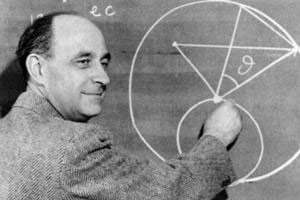 The renowned physicist Enrico Fermi (1901-1954)
The renowned physicist Enrico Fermi (1901-1954)
On July 16, 1945, the United States executed Trinity, the world's first nuclear bomb test, and for better or worse, the herald of the atomic age. The physicist Enrico Fermi recalled the following: "About 40 seconds after the explosion the air blast reached me. I tried to estimate its strength by dropping from about six feet small pieces of paper before, during and after the passage of the blast wave...The shift was about 2 1/2 meters, which, at the time, I estimated to correspond to the blast that would be produced by ten thousand tons of T.N.T."
If we can forgive Fermi for his sterility, it is hard not to marvel at his ingenuity. The official estimate of the bomb's power turned out to be only about twice as large, and it was this uncanny knack for being able to calculate unwieldy quantities that helped earn Fermi a reputation within the physics world.
The concept of the "Fermi Problem"--a hard question made readily accessible by back-of-the-envelope calculations and familiar knowledge--is still powerful in physics and beyond. Science teachers routinely use these types of questions as brain teasers. Economists at the World Bank have used the method to estimate the cost of a potential flu pandemic. The method has even been employed, in the form of the Drake Equation, to assess the likelihood of the existence of aliens. With a little effort, you can try it, too.
To illustrate, consider the classic problem, "How many piano tuners are there in Chicago?" The idea of the Fermi Problem is to break the questions down into a series of steps that you can estimate accurately. For example, I could start with the knowledge that Chicago has a population somewhere in the neighborhood of a million people. It seems reasonable that there is about 1 piano for every 100 people because I have about 200 Facebook friends, and of that group maybe 2 own a piano. This gives me 10 thousand pianos. Then I could assume that a piano needs tuning perhaps once a year, so there are 10 thousand jobs a year. If a piano tuner needs 100 jobs to stay in business, the city of Chicago has about 100 piano tuners. Amazingly, if you are careful you will almost always arrive at the correct answer to within a factor of 10.
The piano problem might be so obscure that no one cares about the answer even after you do find it. Here are a few perhaps more interesting questions, and my estimations:
